The unsafe use of agrochemicals by coffee farmers
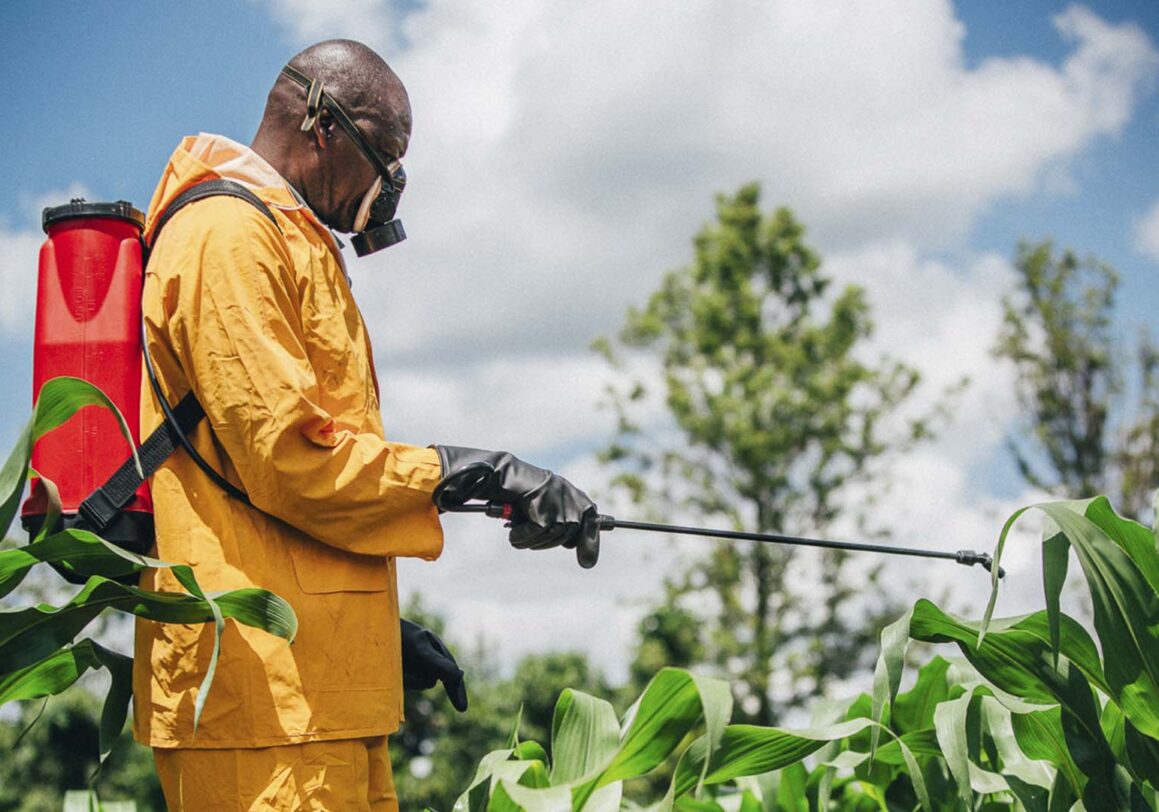
The effects of climate change are triggering increased incidents of pests and diseases in coffee production which if not controlled, can significantly reduce farmers’ yields. That is why many smallholder coffee farmers combat pests and diseases using various types of pesticides, insecticides, fungicides, and herbicides. However, in their pursuit to solve one problem, some farmers end up creating even more problems because they unsafely use agrochemicals. This article will explore some of the dangerous ways farmers use, handle, store, and dispose of agrochemicals, the reasons why they do so, and the health risks associated with this.
1. Health risks associated with the unsafe use of agrochemicals
Agrochemicals are manufactured to kill pests, insects, funguses and weeds which means they are highly toxic to humans and animals alike. The immediate side-effects of pesticide poisoning can include eye and nose irritation, skin rash, asthma, headaches, coughing, dizziness, and stomach-ache. Delayed symptoms due to prolonged or excessive exposure can include tumors, cancer, infertility or sterility in men or women, miscarriage or stillbirth, birth defects, blood disorders, nerve or brain disorders, respiratory or lung disorders, and liver or kidney disorders. If exposure is acute, the poisoning can be fatal.
World Health Organization (WHO) estimates that 3,000,000 cases of severe poisoning due to agrochemicals happen each year with 300,000 of these cases being fatal.
2. Reasons why farmers unsafely use agrochemicals
Lack of knowledge and training
In many developing countries, pesticide laws are lax and not followed. This means there are non-licensed and uninformed dealers who cannot transfer knowledge on safe usage and handling of agrochemicals to farmers. Many rural farmers also have minimal education and may have difficulties in interpreting or understanding the directions and safety instructions on the product labels. Additionally, there is usually a shortage of extensionists and experts that can provide adequate training on safe usage and handling of agrochemicals to farmers. This means many farmers do not even know the dangers associated with the toxic chemicals they spray on their coffee – let alone the appropriate safety measures they should take to guard against poisoning.
Inability to afford adequate personal protective equipment (PPE)
Unlike developed countries where tractors are used to spray agrochemicals, in developing countries, most farmers directly spray pesticides. Therefore, personal protective equipment (PPE) is essential to prevent farmers from coming into direct contact with the hazardous chemicals. However, oftentimes, farmers do not use PPE. This is because in some rural areas, full PPE is not easily available and is often too expensive for some farmers to afford. Others may choose not to wear the full gear because when they are spraying in the heat of the day, it can become hot, sweaty, and uncomfortable.
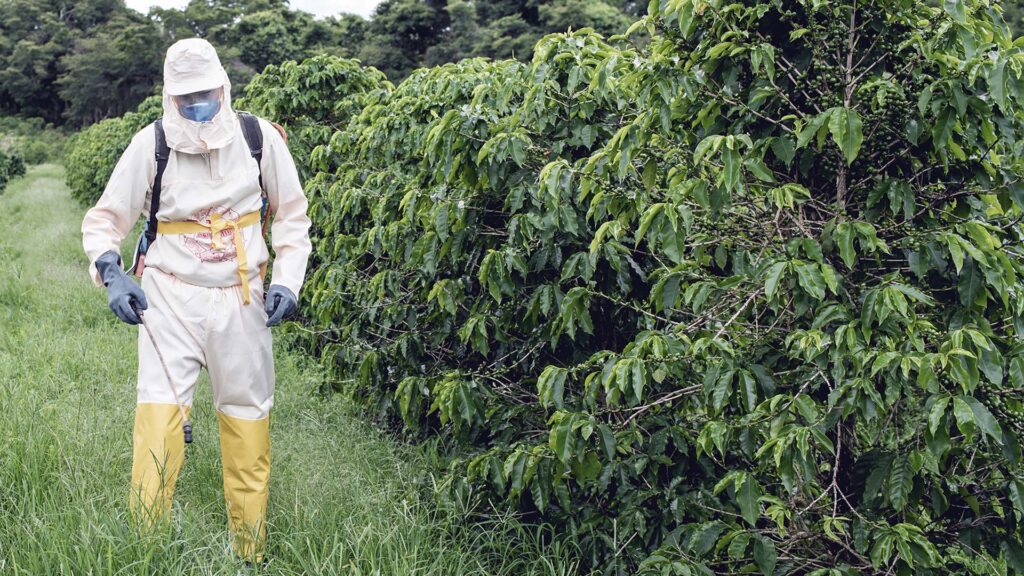
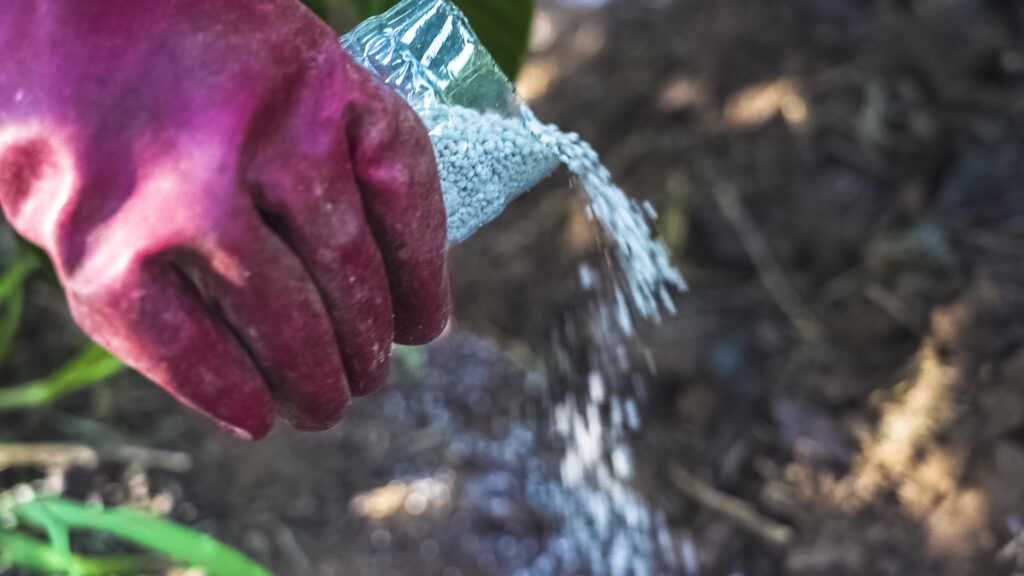
Negligence
Some farmers may be aware that agrochemicals are highly hazardous yet have a lax attitude towards their dangers. They may not deem it necessary to wear gloves if they can wash their hands after mixing or handling the product. Some may think it’s unlikely that the small particles of agrochemicals in the air, or the residues that may land in their nearby crops or water bodies can adversely affect them or result in acute poisoning.
3. Forms of unsafe use, handling, storage, and disposal
Unsafe use
The first and most obvious unsafe use of agrochemicals is not wearing the appropriate PPE. However, even when PPE is used, there are still ways that agrochemicals can be used in an unsafe manner. By not observing the wind direction before spraying, the particles can be drifted to nearby crops, housing, people, water bodies etc. Another unsafe form of using agrochemicals is re-entering the coffee fields less than one week after spraying without wearing PPE. This practice exposes the farmers, their family members and livestock to the toxic chemicals which can result in pesticide poisoning through inhalation.
Unsafe handling
Quite a few coffee farmers apply agrochemicals as mixtures. For example, it is common practice for farmers to mix an insecticide with a fertilizer or an insecticide and a fungicide. This is done to reduce costs of application and increase effectiveness of the agrochemicals. However, the mixing of agrochemicals is dangerous because the active ingredients in one agrochemical may not be compatible with the ingredients in another making the chemicals more dangerous to the farmer who is applying them and also to the plants. Even when farmers do not intentionally mix the agrochemicals, by not washing the sprayers after spraying, the next time they are used with different chemicals there will be cross contamination.
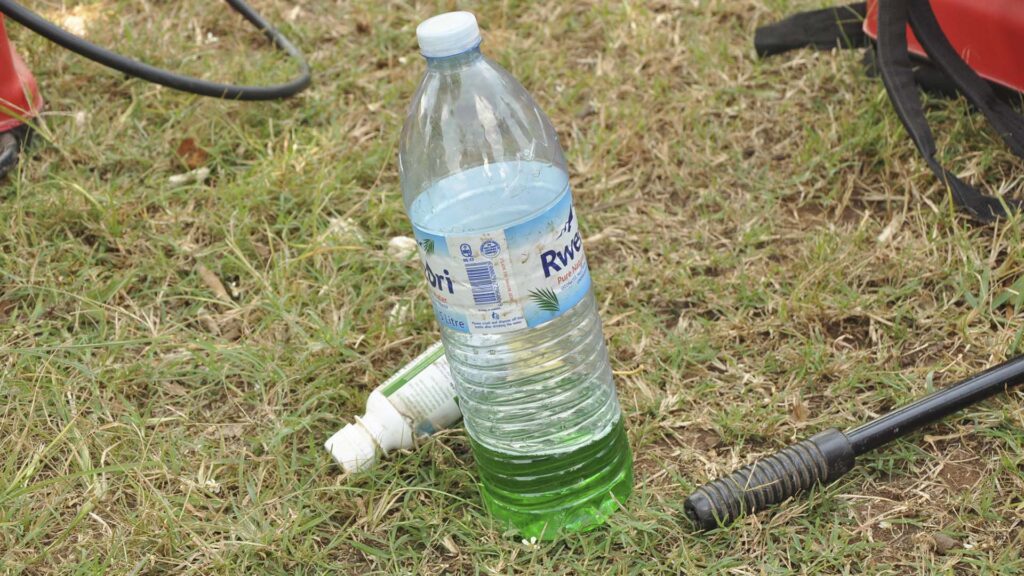
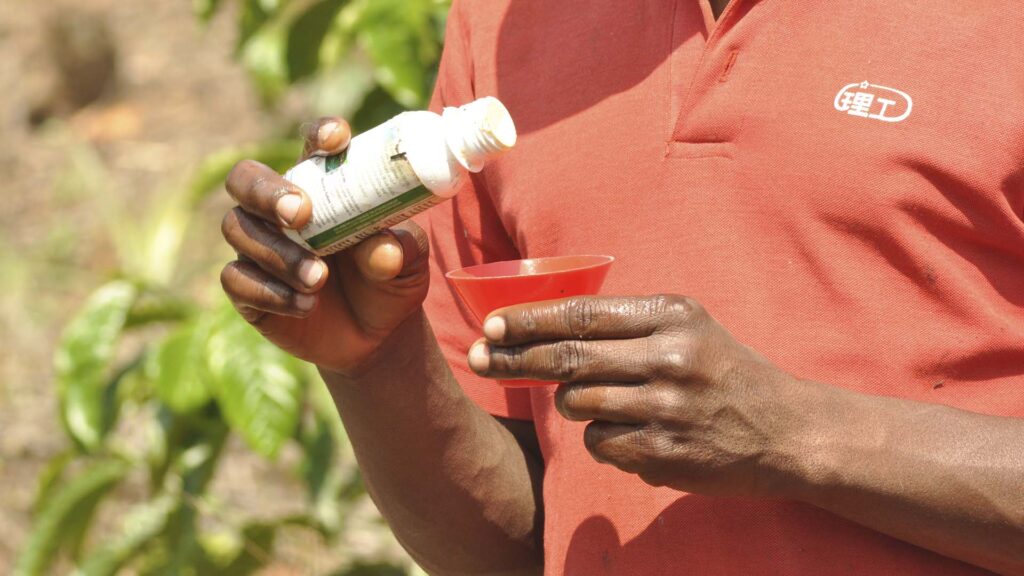
Unsafe storage
Many farmers store pesticides in their houses, either in a cupboard or in their bedrooms. By doing so, farmers run the risk of family members consuming the substance – especially children. In some rural areas, it is common practice to buy agrochemicals in smaller quantities and transfer them into recycled containers or bottles. This is usually because the price of some agrochemicals is too high for some farmers to afford. This makes the probability of mistaking the agrochemicals for another substance higher.
Unsafe disposal
Many farmers use poor methods of pesticide disposal. Some wash the containers to reuse them as bottles to store drinking water or cooking oil. Others dispose of the wastewater from washing the empty containers on their farms or in the bush. This can cause runoff with the rain and contaminate the surrounding plants, soil, and water bodies that people or animals may drink. Other farmers burn the empty pesticide containers which is not only bad for the environment but also releases toxic fumes that are hazardous if inhaled.
4. Solutions

Farmers need to be supported with the knowledge on safe agrochemical use and management as well as information on toxicity levels and banned chemicals. This includes finding traditional alternatives where necessary for an integrated pest and disease management.
Some of the solutions that the initiative for coffee&climate (c&c) is already implementing in the regions where we operate include continuously testing innovative practices and approaches that fit the specific climatic and environmental conditions of the region. Farmers are supported by field staff of Hanns R. Neumann Stiftung (HRNS) – the implementing partner of c&c with knowledge on safe use and handling of agrochemicals, including more traditional ways to fight against pest and diseases on coffee farms. For example, to get rid of pests, farmers in Uganda are encouraged to use alcohol insect traps that attract and kill pests. Farmers are also encouraged to pluck and burn branches and leaves of trees that are infected by coffee leaf rust or coffee wilt disease. In Brazil, HRNS field staff are supporting farmers with knowledge on how to reuse organic waste from wet processed coffee as fertilizer to reduce the need to apply agrochemicals.
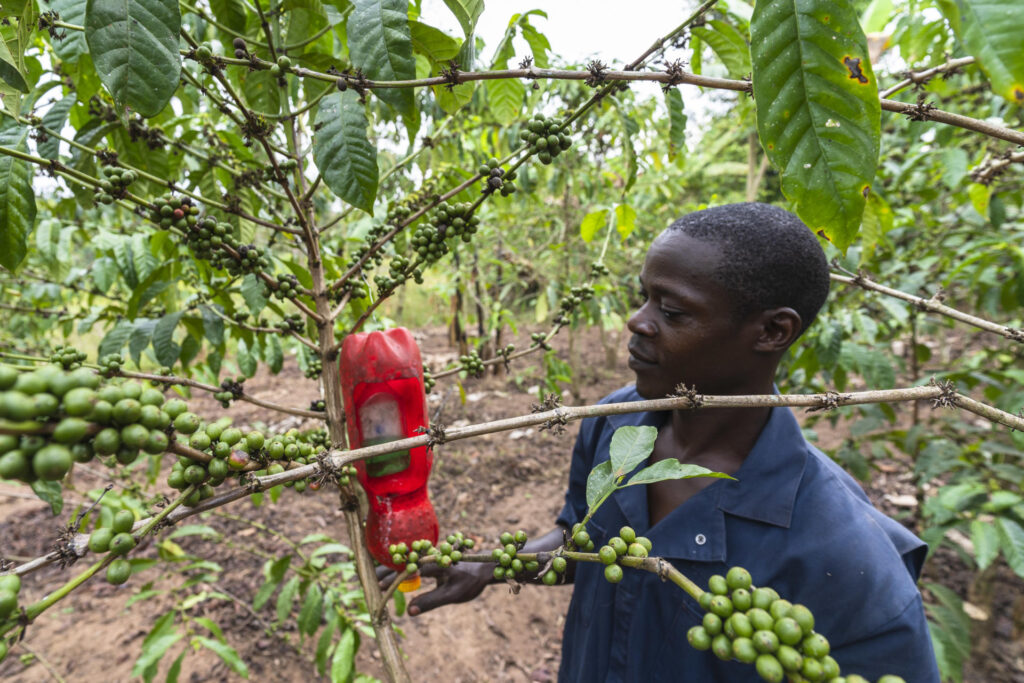
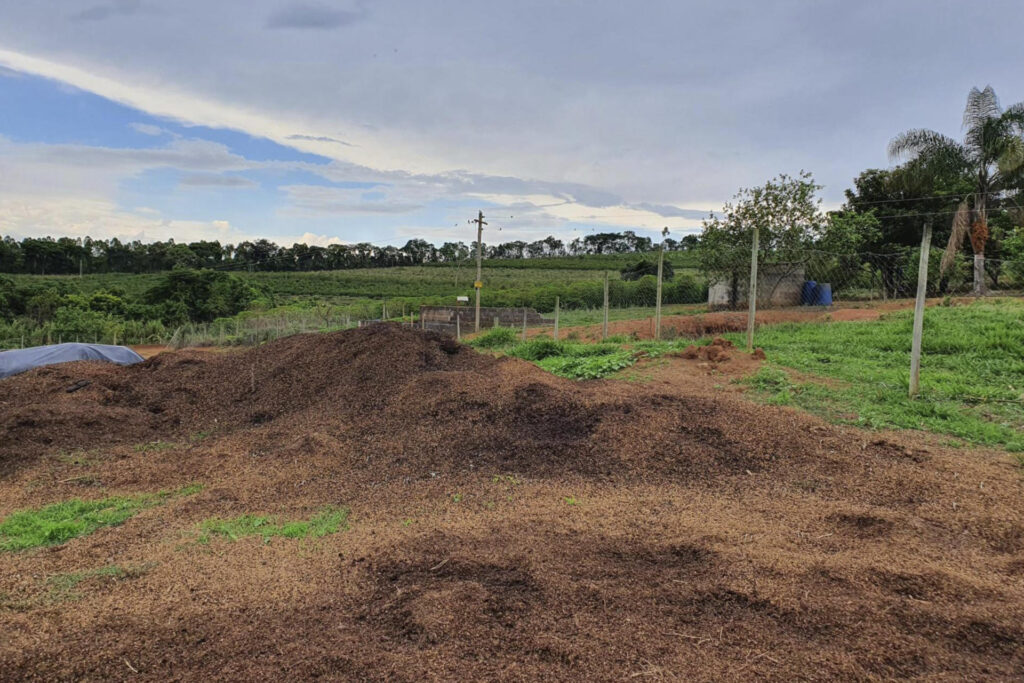
It is also important for the public sector to ensure that the laws surrounding agrochemicals are followed and that the status of pesticide distribution and use is regulated. Relevant measures include ensuring only licensed dealers are selling agrochemicals, banned chemicals are not available and integrated pest and disease management approaches are promoted to farmers. Licensed dealers should also be encouraged to offer training to the farmers who come to buy pesticides from their input shops so that farmers are made more aware on the safe usage, handling, storage and disposal of agrochemicals.